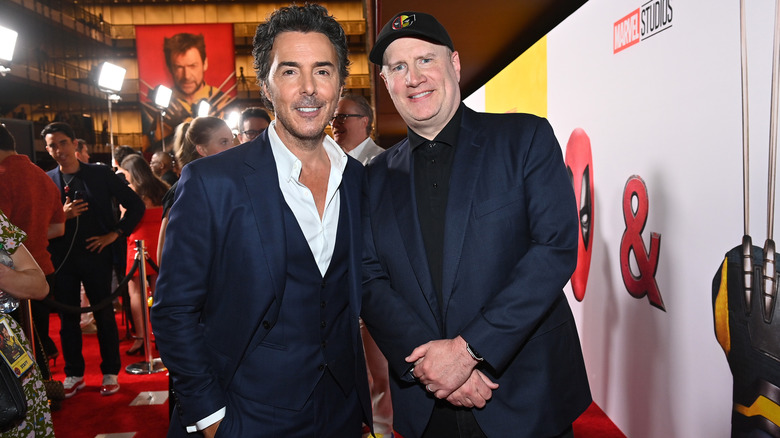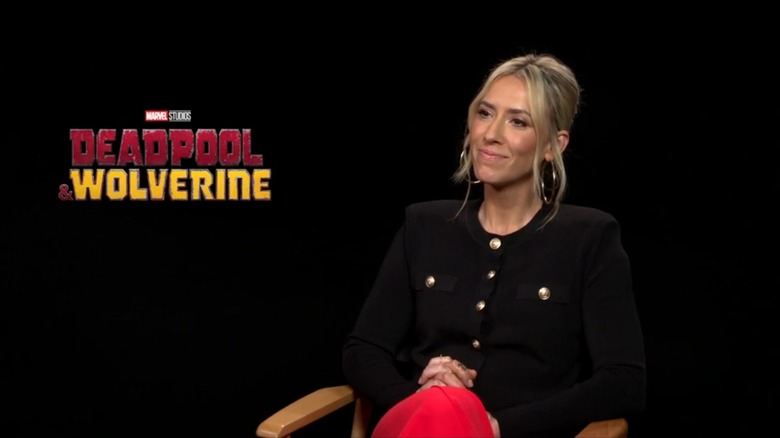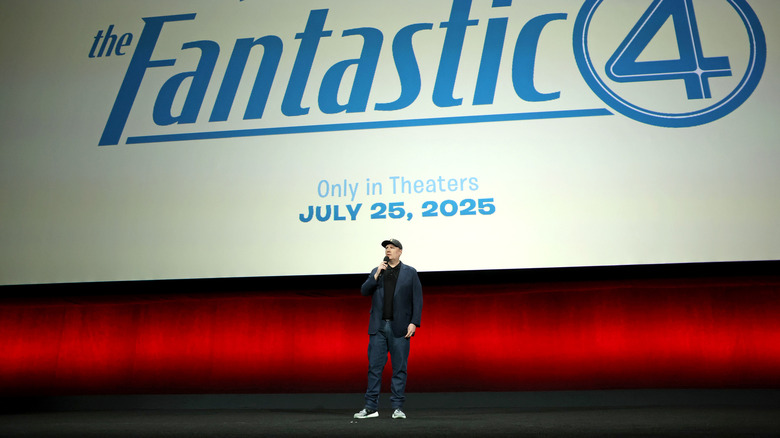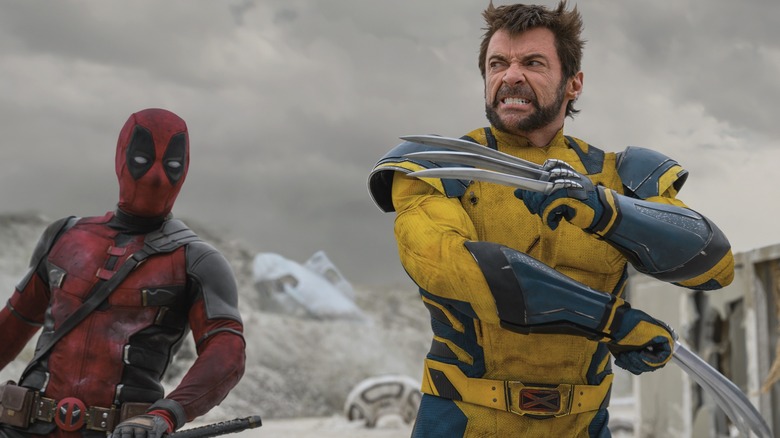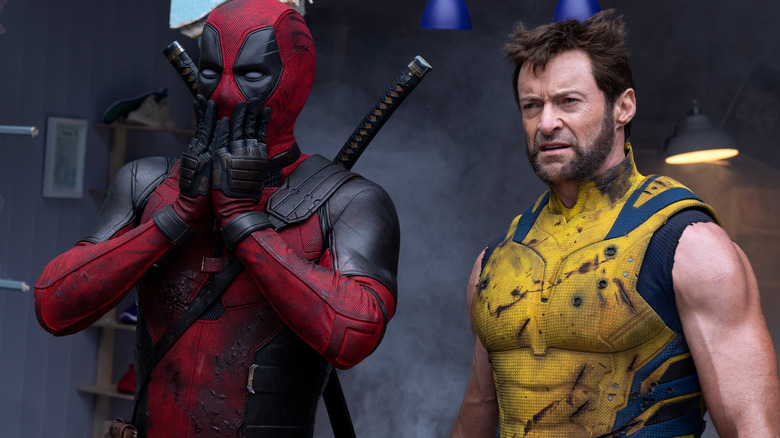Marvel's Kevin Feige Only Saw One Risk When Making Deadpool & Wolverine [Exclusive Interview]
The Marvel Cinematic Universe might never be the same again after "Deadpool & Wolverine," and that's exactly what Kevin Feige is counting on. The longtime Marvel president has shepherded one of the world's most popular franchises through more than 15 years of epic highs and, more recently, a somewhat surprising amount of lows. The upcoming team-up flick arrives at something of a crossroads for a series that was always considered to be as impervious to damage as Wolverine himself, though now it has some work to do to reach the same heights as before ... and director Shawn Levy, stars Ryan Reynolds and Hugh Jackman, and even Feige himself all seem well aware of that fact. That's saying nothing of the movie itself, of course, which showed off the first 35 minutes or so for film journalists this past weekend (prior to this week's world premiere, which has unleashed a flood of reactions).
That initial chunk of footage was all Marvel allowed us to see before preparing questions for the creative team behind "Deadpool & Wolverine," adding even more obstacles to the already-Herculean effort of getting anybody involved to open up about the production without spoiling anything. I took that as a personal challenge when it came time to talk with Feige and fellow producer Wendy Jacobson and, well, there's a reason why Disney's media-training machine isn't to be trifled with. That said, I still managed to glean some fascinating insights from both Jacobson and the baseball cap-wearing executive. Among the highlights: Early concepts for a version of "Deadpool 3" without Wolverine, how Jackman saved the production from a significant "retool," the critical lessons learned from bringing Spider-Man into the MCU, and Feige's thoughts on the review-bombing trend.
Note: This interview has been lightly edited for clarity and brevity.
Producer Wendy Jacobson reveals the wackiest Deadpool 3 ideas
Wendy, looking back at your career, this isn't your first Marvel rodeo. I was pleased to find out you did "She-Hulk" before this.
Wendy Jacobson: Thank you so much.
Was that series ever used as a case study that, since Marvel fans already know a character that can break the fourth wall, maybe they can handle whatever Deadpool can throw at them?
[Laughs] Maybe. I think the truth is, with breaking the fourth wall, that comes from the source material for both characters, right? And "She-Hulk" was unique because it was the first time we were doing a series about this character in the MCU, but Deadpool was also unique because it's really the first time that we were inheriting a character with its own history and legacy. So, I definitely got to take great experience from "She-Hulk" and bring it into "Deadpool." But truthfully, with Ryan and Hugh and Shawn, you're just letting those guys do their thing and I'm just here to help in any way that I can.
Before Hugh joined the project, Ryan and Shawn have hinted about all the different versions that this movie could have been. Can you think of any specific ideas off the top of your head?
[Laughs] There was definitely a "Sundance-size road trip with Dopinder" movie on the table. At one point, Ryan had this idea for a "Thor 2" frame-for-frame remake until the end of the first act. There was an idea for a deleted-scenes extravaganza where we were going to take famous MCU scenes, but show them from a different angle where you didn't see that Deadpool got left on the cutting room floor. I mean, it was all over the place.
After Deadpool & Wolverine, Kevin Feige is setting his sights on The Fantastic Four and X-Men
So, Kevin, you and Hugh Jackman have this neat shared history going back to the first "X-Men" movie. Ryan Reynolds and Shawn Levy have talked a lot about the saga of getting him involved in this movie, turning it from "Deadpool 3" to "Deadpool & Wolverine" and how the whole movie clicked into place. Did you ever reach out personally, using that connection that you had with Hugh, to bring him on board and give him that final push?
Kevin Feige: No. No, I didn't. I had met with Hugh a few years before that, when Disney had bought Fox and "Logan" had just come out and we were working on "Infinity War" and "Endgame," where I was trying to find a great ending for Tony Stark the way "Logan" had a great ending. And I had said to Hugh, "Don't screw with that ending." [Laughs] "You did it, it was perfect." And so, we didn't think about it.
I think Ryan had always liked that idea of teaming up with his friend, but we were working on various versions of what a "Deadpool" [movie] within the MCU could be. And Shawn came on and there were great ideas, many of which are in the final version of the movie that people will see. But there was something missing and it literally was on the same day that we had a call scheduled and I was going to suggest we take a step back and kind of retool and think about what's missing, when Hugh Jackman called Ryan and said, "I want to come back." And it happened extremely quickly and absolutely, as you said, it clicked right into place there.
Jumping off of that, how does it feel to be the person who's had that connection with "X-Men" and now you're the one who's helping bring the X-Men into the MCU proper? Does it feel like a full-circle moment for you?
It does. It also feels like that promise fulfilled for Marvel Studios, to be able to have access to those characters for the first time — and not just the X-Men, [but] the Fantastic Four. It's great, and it feels like being able to take everything we've learned over the years and now apply them to "Fantastic Four," which we start shooting [this] week, and to the X-Men, starting with "Deadpool & Wolverine."
How Spider-Man influenced Deadpool & Wolverine
I have to imagine with this kind of movie, when you're in your office and you know that filming is going on and you're getting the dailies, you're just nerding out, I'm sure. Did you find yourself wanting to fly out to set more often, just to see what they're up to down there or ... ?
I wouldn't say more often. You always sort of look at the schedule and try to find times where you can see key moments, of which there are many on this movie, and then getting the dailies. And also, everybody had such a good time making this movie, that Ryan or Shawn would send me a text about what had just happened on set, how excited they were that something was just coming together. Many of which are still spoilers, so I won't get into, but it was a very fun process, making the movie.
You mentioned before that this isn't the first time you've inherited a Marvel character you didn't previously have the rights to. I know this isn't exactly the same as bringing in Tom Holland as a new version of Spider-Man or something, but were there any lessons learned from that experience? Were there any similarities in approach that you brought to "Deadpool & Wolverine"?
Well, with "Spider-Man" and with "Deadpool & Wolverine" and looking ahead to "X-Men," what is so incredible — and this was part of what we were talking about with Sony on "Spider-Man" — is, even though Spidey had been in so many movies up to that point, there was so much that had not been done. There is so much from his stories in the comics that had not been done. And, to me, that's a testament to the Marvel Comics storylines and creators and artists, that these characters are so rich, with so many iconic elements, that you can have already five movies, 10 movies, 12 movies, and not have translated, in some ways, their most iconic aspects.
So, of course, Wolverine's costume is the most direct example of that on this film. And that was when, after Hugh had spoken to Ryan and Shawn, we'd all gotten together, we decided we're going to try to make this happen. I had reconnected with Hugh and towards the end of the call said, "Well, there's a lot to figure out. But you know what we have to do, no matter what? Put you in the yellow outfit." And he was like, "Absolutely."
Kevin Feige on the biggest risk in Deadpool & Wolverine
From what we've seen of the movie, it feels like there's nothing sacred. Nothing's off the table, everything's up for grabs. The movie pokes fun at you, it pokes fun at the Marvel Cinematic Universe, in general, and even the narrative that the franchise has sort of lost its way since "Endgame." Did that ever make you nervous? Was that a risk that you found worth taking with this movie to include these ... ?
The only risk to us was sanding down the rough edges of Deadpool. The only risk was accidentally pulling him back from what makes Deadpool, Deadpool. So, things like that, absolutely, he has to do. Because that's what Deadpool would do. That's what he did in the comics, that's what Ryan did in the other movies, that's what he had to do. So that actually is what we were, early on, most attuned to, was letting Deadpool keep being Deadpool.
Were you and Shawn and Ryan always on the same page in terms of how far to push Deadpool as a character and how much to pull back, at the risk of breaking the MCU or anything like that?
I think so. I mean, the truth is, Ryan was as sensitive to that as anybody. Ryan and Shawn are huge fans. It was the mutual admiration society. We kept saying how much we loved the other "Deadpool" movies, and he kept talking about how much he loved all of the MCU movies. So, nobody wanted to break things either way. And that was something that was quite clear early on, working with them, is what an amazing partner he is and how invested he was. And even, I think in the first 37 minutes you've seen, and certainly, as you see the rest of the movie, the love that Deadpool has for the other Marvel characters is very apparent.
You see this social media phenomenon of review bombing: "Captain Marvel," "The Marvels," or anything that happens to forefront women and/or people of color — funny how that works.
Right.
Are there any protocols in place from Marvel's point of view, for combating that and just protecting the cast, protecting the movie in general?
It's a very good question. I do think we are always there to support, and we always take things with a grain of salt. When things like that happen, I think that's very clear. And as you just pointed out, when things like that are occurring, protecting the cast is the priority. But, I think social media can often be a toxic place, and if anybody has the cure to that, I'd love to be able to utilize it.
"Deadpool & Wolverine" is in theaters now.
